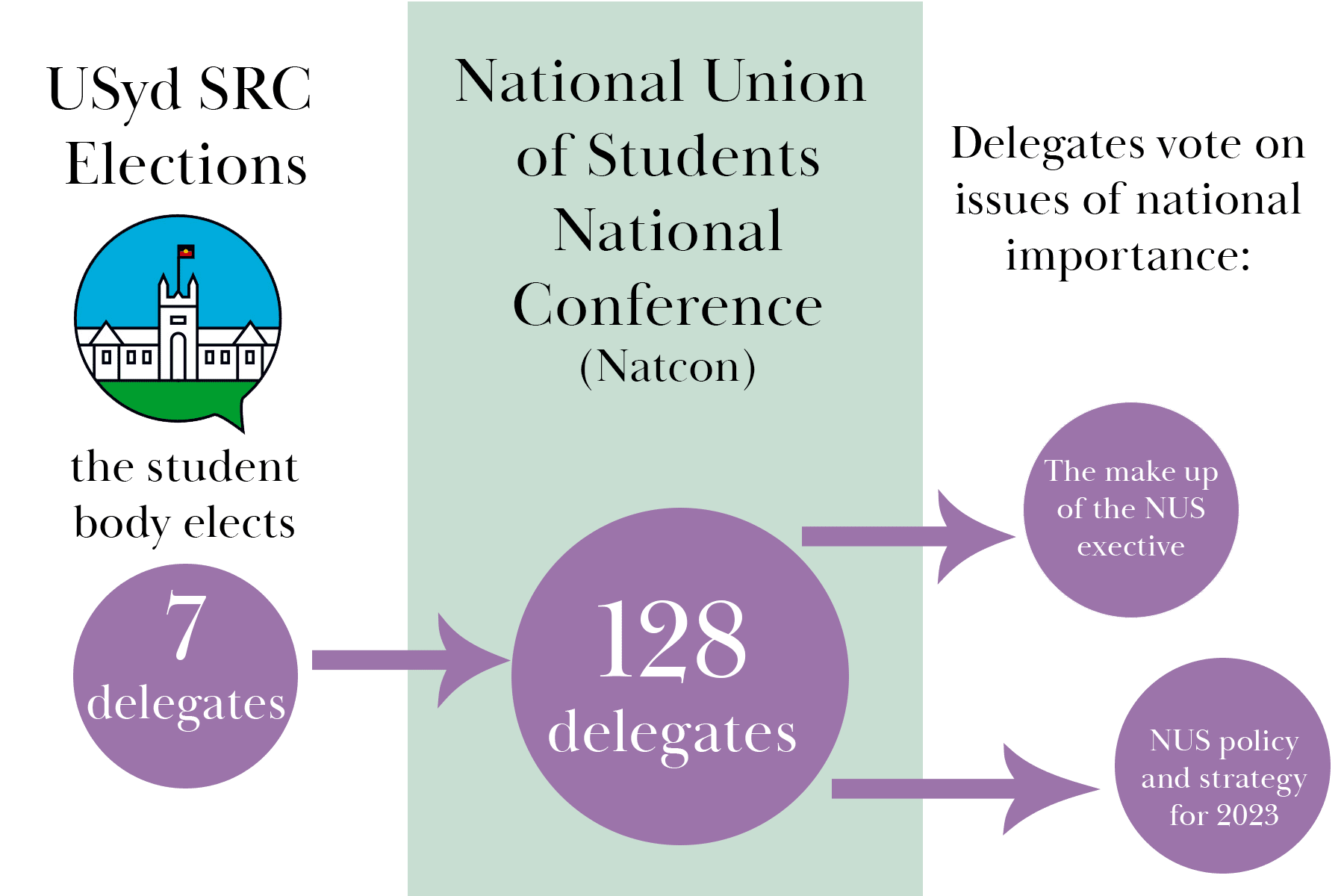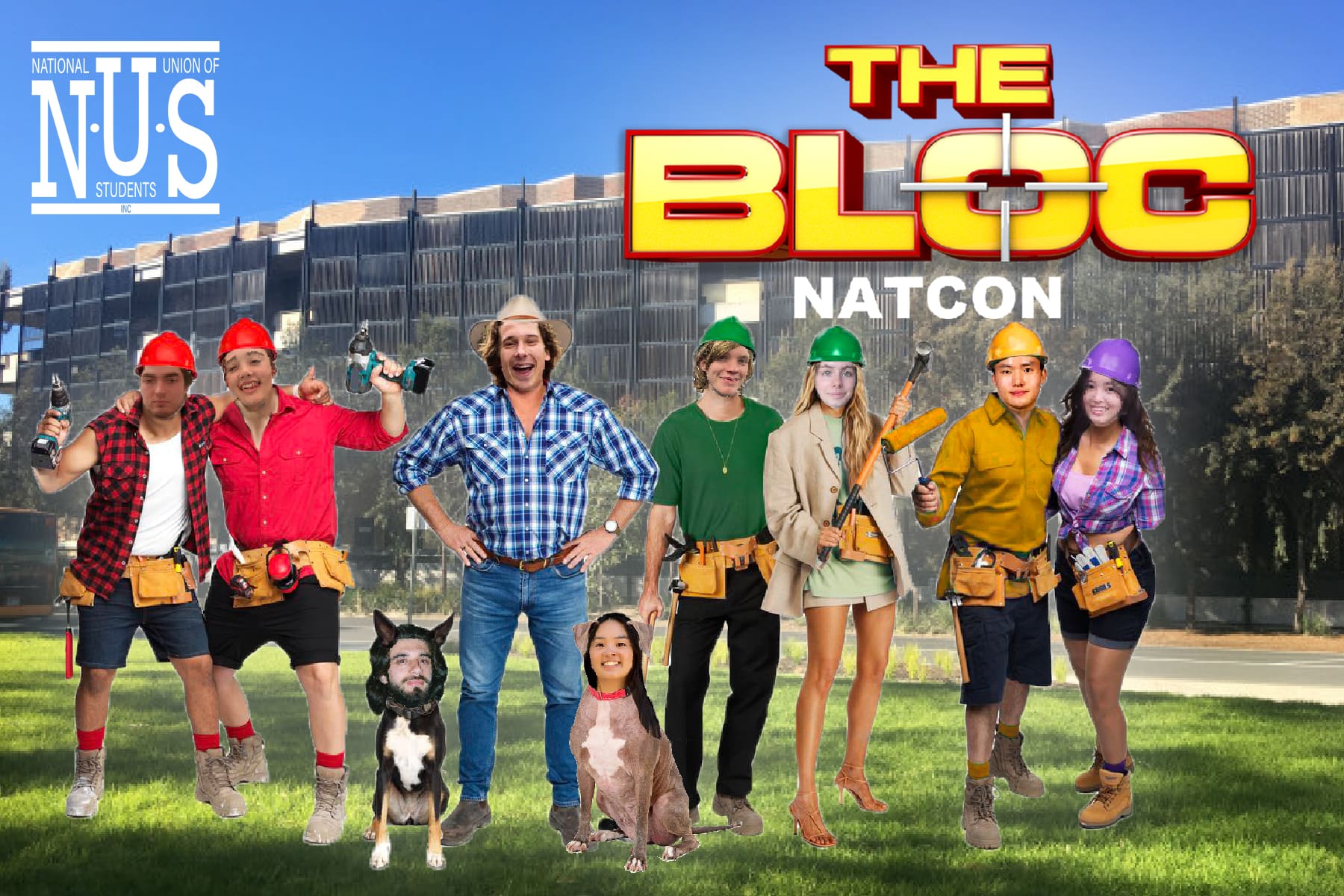Got some gossip? Drop us an anonymous tip here or email editors@honisoit.com
A wild-eyed Trotskyist snatches and swallows your ballot paper. A rat-moustached Labor hack is going on a rant about Honi Soit. Sneering student politicians are blocking all the doors. This isn’t a nightmare, this is NatCon — but we’re still trying to figure out the difference.
What is the National Union of Students?
The National Union of Students (NUS) is the peak representative body for Australian tertiary students. It consists of affiliated student unions from across the country, including the University of Sydney Students’ Representative Council (SRC). The NUS was created to represent students’ interests on a national level. It functions primarily through a combination of lobbying and activism.
The NUS website lists their primary objective as to “work for the interest of students” by improving:
· Quality of education
· Academic freedom
· Access to education
· social security
· health and welfare
Student unions across the country have the option of affiliating with NUS by paying an affiliation fee. This allows them to send delegates to the NUS, giving them a say in its leadership and policy direction.
The NUS is also where future politicians cut their teeth, learning the wheeling and dealing of factionalism and politicking. The alumni of the NUS and its predecessor, the Australian Union of Students, include former Prime Ministers Julia Gillard and Tony Abbott, Deputy Prime Minister Richard Marles and NSW Labor MLC Rose Jackson.
What is NatCon?
The NUS meets every December at the National Conference, also known as “NatCon” or “hell.” At NatCon, delegates debate and determine what the NUS policy will be for the year ahead. What will affect students the most in 2023? Should there be a greater focus on lobbying or activism? Is the Labor party evil? Who knows, debates at NatCon are largely performative, with most factions pre-determining how they’ll vote beforehand.
This marks the first NatCon since 2012 to be held with a Federal Labor government in power. This will greatly impact the conference and reignite the lobbying/activism debate especially given the dominance of Labor factions and Labor’s upcoming Australian Universities Accord.
NatCon also features the election of the National Executive, which includes paid and unpaid Office Bearer (OB) positions.
The paid OBs roles include President, General Secretary, Education Officer, Welfare Officer, Womens’ Officer and two Queer Officers. The unpaid OBs include the First Nations’ Officer, Disabilities Officer, International Officer, Ethnocultural Officer and the Small & Regional Officer.
The current President is Georgie Beatty (NLS, Labor Left) and the current General Secretary is Emily Šagolj (Unity, Labor Right). This represents the ‘sweetheart deal’ that exists between the two factions, in which NLS holds the Presidency and Unity holds the role of GenSec. Although there have been tensions between them, the deal has gone ahead every year (bar one) since 1992 and is predicted to determine the President and GenSec for 2023.
How does it work?
NatCon 2022 will be made up of a total of 128 delegates from the NUS-affiliated student unions. You vote for NUS delegates at SRC elections, and those delegates then go on to vote on the direction of the NUS at NatCon. Put simply, if NatCon is Parliament, delegates are the MPs.
The number of delegates allocated to each university is based on the number of students studying equivalent full-time student loads (EFTLs). Universities can receive up to seven delegates each. The voting power of each delegate is determined by the amount of each union’s EFTLs. The more full-time students, the more votes each delegate holds, the more relevant larger universities become.
For example, although University of Melbourne Union (UMSU) and the University of Wollongong (WUSA) each control seven delegates, UMSU controls 109 votes while WUSA only controls 39. Delegates representing the USyd SRC control a combined total of 72 votes.

Who are USyd’s delegates to NatCon?
| Deaglan Godwin | Grassroots for NUS* | SAlt | 2022 Education Officer, Current Global Solidarity Officer |
| Simon Upitis | Left Action for NUS | SAlt | Current Environment Officer |
| Jasmine Donnelly | Switch for NUS* | NLS | Current General Secretary |
| Henri Collyer | Amplify for NUS | NLS | |
| Aileen Tan | Lift for NUS | Liberal | |
| Keiron Marc Lee | Students First | Young Australian Democrats |
*As a result of a pre-election deal, this brand is different to the faction that the delegate belongs to. Read the “Grassroots Left” segment for more.
Why should I tune in?
Because you’re paying for it. USyd generally pays over $75,000 to the NUS every year in affiliation fees, not to mention the money spent on travel costs to NatCon.
The influence and resources of the NUS means it is in a uniquely powerful position to advocate for students’ interests. As a result, the NUS remains relevant to all students and anyone concerned about the state of the higher education system in Australia.
Who are the contestants?
There are four factions that matter at NatCon: Student Unity, National Labor Students (NLS), the Grassroots Independents (Grindies) and Socialist Alternative (SAlt). In the past, Unity, NLS and the Grindies have worked together to lock SAlt out of OB positions. Due to the rise of SAlt and collapse of the Grindies this year (read more below), SAlt have been included in the deal and are tipped to hold the paid OB position of Education Officer, which has been held by the Grindies since 2020.
Student Unity (SU, Unity, Labor Right)
Share of total delegates: ~42-43%*
Tipped to pick up: General Secretary, Welfare, Womens’
Unity, the largest faction in the NUS, is associated with the right wing of the Labor Party. They generally espouse a Third Way political outlook, with a preference for direct government lobbying over student activism. They have historically commanded the most delegates at NatCon, and therefore play a major role in determining the makeup of the NUS Executive every year. They currently hold seven of the twelve positions on the NUS executive, including four of the six paid positions.

Supporters of Unity cite their enormous delegate share as evidence of their support from students and of their ability to mobilise political support. Critics of Unity view them as unambitious and not representative of left-wing values. For instance, they refer to how Unity has moved motions to support police unions, and call for the reform of HECS fees as opposed to directly fighting for free tertiary education.
USyd Unity has been disaffiliated from the national caucus since NatCon 2021. In the 2022 USyd SRC election, they ran under the brands “Stand Up” and “Deez for NUS,” but their candidates were not successful in being elected as delegates.
National Labor Students (NLS, Labor Left):
Share of total delegates: ~25%*
Tipped to pick up: President
NLS is traditionally the second or third largest faction in the NUS, representing the left wing of the Labor Party. Their platform is considerably more progressive than Unity and they typically attempt to strike a balance between activism and lobbying in the NUS. Unlike Student Unity, their constitution prohibits them from negotiating with, voting for, or supporting the Liberal faction. They currently hold four of the twelve positions on the NUS executive, including the presidency.

Supporters of NLS view them as being able to hold the Labor Party to account and bring them toward the left without being obstructionist. Critics cite NLS’ support of the Labor Party as antithetical to the left-wing values they espouse.
At USyd, NLS ran under “Amplify” and “Grassroots” brands and successfully elected two candidates as NUS Delegates: Henri Collyer and current SRC General Secretary Jasmine Donnelly.
Grassroots Left (Groots, Grindies):
Share of total delegates: ~<5%*
Tipped to pick up: Queer Officer
As a broad coalition of left-wing activists, Grassroots (Groots) position themselves as left of the Labor Party and place a stronger emphasis on activism over lobbying. Although they are not formally aligned with any major political party, supporters of The Greens typically align with them. Unlike the Labor factions, they are non-binding and have no factionally predetermined way that they will vote on each issue, meaning members are not required to vote with the rest of the faction.

Groots merged with the WA-based National Independents (Indies) ahead of 2018 NatCon to become the “Grindies,” with the hope of increasing the efficacy of their activism. This catapulted them to controlling over 20% of the delegates in recent years. Despite the merger, tensions persisted between Groots, who are more radical, and the Indies, who have been more willing to cooperate with the Labor Party. They split in 2022, with many Indies joining NLS, leaving Groots in a significantly weaker position heading into NatCon this year. Despite the split, some people still call them Grindies.
Groots at USyd (also known as Switchroots) run under ‘Switch’ and ‘Grassroots’ brands and have held the USyd SRC Presidency since 2020. In 2022, Switchroots allowed NLS and SAlt members to run under Switch and Grassroots branding in exchange for NLS and SAlt supporting their bid for the presidency. As a result, there are no USyd Grassroots delegates this year, further diminishing their influence within the NUS.
Socialist Alternative (SAlt, SA, Trots):
Share of total delegates: ~23%*
Tipped to pick up: Education Officer
Socialist Alternative are a revolutionary Trotskyist faction who are known for their bombastic behaviour on the conference floor and open hostility toward the Labor Party. They are affiliated with the Victorian Socialists party and place a stronger emphasis on activism over lobbying. Following a swing toward them in NSW (partially reflected in our SRC election), SAlt enters 2022 NatCon in a stronger position than normal and are tipped to pick up the role of Education Officer, which they have not held since 2018.

Supporters of SAlt cite them as a highly organised group of activists and the “most left-wing” faction within the NUS. Critics of SAlt label them as hypocrites for dealing with Unity this year, which SAlt has criticised NLS and Grindies for doing in the past.
At USyd, SAlt ran under the “Left Action” and “Grassroots” brands and was successful in electing three candidates as NUS Delegates: Current SRC Environment Officers Maddie Clark and Simon Upitis, and 2022 SRC Education Officer Deaglan Godwin.
*These are rough estimates and are not intended to be precise predictions.
There are other factions at NatCon – such as the Australian Young Democrats and the much-maligned Liberals – but they play a pretty insignificant role due to their lack of delegates. There are also independents who are not aligned with any faction, but they too are unable to exert any real influence.
You can read Honi’s 2021 and 2020 explanations of NatCon here.
Disclaimer: Luke Mesterovic is a former member of Student Unity.





